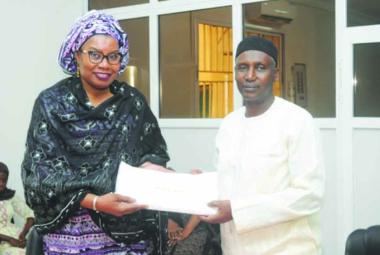Jeddah (UNA-OIC) - Government officials and experts in combating corruption and financial crimes stressed Yesterday, Wednesday, the need for international cooperation in confronting these crimes, which have become cross-border and are developing rapidly.
This came during the second and final day of "the First Ministerial Meeting of Anti-Corruption Law Enforcement Agencies in the Member States of the Organization of Islamic Cooperation (OIC) to adopt the Makkah Al-Mukarramah Convention" hosted by Saudi Arabia, represented by the Oversight and Anti-Corruption Authority (Nazaha), in Jeddah.
During a session on "Cooperation between the legal agencies to combat corruption", the Chairman of the Administrative Control Authority in the Arab Republic of Egypt, Major-General Amr Adel, stressed the importance of international cooperation given the development of cross-border crimes and the electronic development that the whole world is witnessing in communication networks, databases and information exchange.
He explained that there are two types of crimes; the first is organized crime or criminal network crimes, which are usually money laundering crimes, illegal immigration crimes, or human trafficking crimes, pointing out that these crimes do not usually take place on a local scale, but are carried out through different and across the territory of more than one country.
"The second type is what we call major corruption crimes that are associated with senior officials in the state, persons with immunities, or fraud and commission crimes in major commercial deals," Adel added, pointing out that the consequences of these crimes also extend to other countries.
He indicated that those involved in financial corruption crimes usually invest these funds outside their countries because most countries impose financial disclosure statements on state officials, in addition to monitoring the banking sector by anti-money laundering units.
"The problem of investing these funds is no longer limited to what is known as haven countries; there are also some countries that pursue foreign investments, offering advantages in return for investment activity at a certain value, which tempts the corrupt to invest their money, manage it, and keep it abroad," the Egyptian official said.
He stressed that there is a need for international cooperation and integration between the concerned agencies as well as implementing international agreements and activating the activity of international networks to confront financial crimes.
For his part, the Minister for Law, Justice and Parliamentary Affairs of the Republic of Bangladesh, Anisol Haq, presented his country's experience in facing financial crimes.
He indicated that his country was able to achieve significant progress in this aspect by assigning the investigation of this type of crime to several government agencies, which led to speeding up investigations and having them conducted by experts.
He revealed that the acceleration of digital transformation has also led to stopping financial crimes in the country because digitization helps monitor and track money.
"Despite this progress, the problem of "recovering assets" remained," the Minister said, stressing that this problem requires international cooperation.
The Executive Director of the United Nations Office on Drugs and Crime, Ghada Waly, said that the approval of the "Makkah Convention" demonstrates the commitment of the OIC countries to work with each other because corruption is a cross-border crime in which money is transferred through the financial systems from one country to another.
She stressed that combating corruption has become a priority for governments and people, noting that the United Nations has developed a common position regarding this issue.
She noted the initiatives introduced to combat corruption during the Kingdom of Saudi Arabia's presidency of the Group of Twenty, including the "GlobE" network in which government agencies exchange information and data to coordinate with each other.
"The network is the first official network that provides easy and safe communication for coordination and cooperation among law enforcement agencies in the fight against corruption," Waly said.
She warned of the interdependence between combating corruption and security, pointing out that corruption makes it easier for criminal groups to move around and finance terrorist acts.
The Secretary-General of the International Criminal Police Organization (INTERPOL), Jürgen Stock, indicated that the organization is intensifying its global efforts to confront all manifestations of financial crimes, calling for more coordination to exchange information.
He revealed that INTERPOL runs a number of networks specialized in the exchange of information, including the Global Focal Point Network on Anti-Corruption and Asset Recovery, which includes 140 countries and more than 247 focal points.
He stressed that Interpol is working to ensure that there are no safe havens worldwide.
In another session, several experts discussed the Makkah Convention's role in enhancing cooperation among the OIC member states in combating corruption and exchanging information.
The ministerial meeting concluded its work on Wednesday. On its first day, the meeting witnessed the adoption of the "Makkah Al-Mukarramah Convention" which establishes new mechanisms to cooperate in fighting corruption within OIC geography and complement other existing international conventions.






